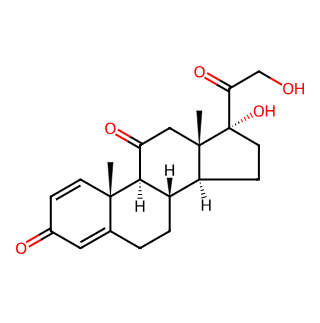- Synthetic anti-infective drugs
- Medications for the digestive system
- Antipyretic and analgesic drugs
- Medications for the blood system
- Medications for the respiratory system
- Anti-allergic drugs
- Medications for the urinary system
- Diagnostic medications
- Immunosuppressive and immunomodulatory drugs
- Vitamins and mineral supplements
- Antioxidants and medications for osteoporosis
- Antiparasitic drugs
- Ophthalmic medications
- Amino acids and their derivatives
- Dermatological medications
- Medications for the circulatory system
- Antitumor drugs
- Medications for the nervous system
- Hormonal and endocrine function-regulating drugs
- Antibiotics
- Others
CAS No.: 53-03-2




Prednisone
Prednisone is an adrenocortical hormone drug belonging to the glucocorticoid class.
Basic Information
English Name: Prednisone
CAS No.: 53-03-2
Molecular Formula: C21H26O5
Molecular Weight: 358.43
Pharmacological Action
Prednisone exerts its effects after being converted to Prednisolone in the body. It primarily possesses anti-inflammatory, anti-allergic, and immunosuppressive properties. Acting on the S and G2 phases of leukemia and tumor cells, it delays the G1/S boundary, leading to increased fatty acid content and disintegration of leukemia cells. Additionally, Prednisone can cross the blood-brain barrier, with lesser water and sodium retention and potassium excretion effects compared to hydrocortisone, but enhanced anti-inflammatory and anti-allergic effects.
Indications
Prednisone has a wide range of indications, including:
Autoimmune diseases such as systemic lupus erythematosus, rheumatoid arthritis, rheumatic fever, and nephrotic syndrome.
Chronic active hepatitis, ulcerative colitis, autoimmune hemolytic anemia, idiopathic thrombocytopenic purpura, and other diseases.
Shock treatment, such as cardiogenic shock caused by acute myocardial infarction or heart block.
Allergic diseases and reactions, such as drug-induced dermatitis.
Adjuvant therapy for infectious diseases, such as tuberculosis after anti-tuberculous treatment.
Prevention and treatment of rejection reactions in organ transplantation.
Treatment of leukemia, hematopoietic tissue tumors, and solid tumors.
Ophthalmic diseases, such as conjunctivitis, keratitis, retinitis, and optic neuritis.
Dermatological conditions, such as severe drug-induced dermatitis, keloids, and hypertrophic scars.

Tai Yau Street, San Po Kong, Kowloon, Hong Kong, China.



